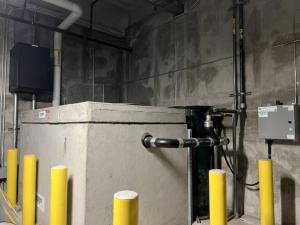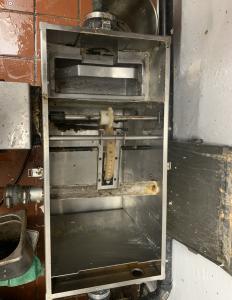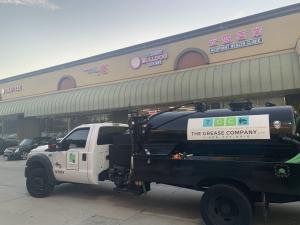San Diego Fights Sewer Overflows- Local Experts Warn Restaurants About Grease Trap Neglect and Improper Oil Disposal

San Diego Grease Company, the fastest growing grease management company, providing grease removal and oil collection services for years.
San Diego restaurants urged to maintain grease traps and use certified oil collection to prevent sewer overflows, protect plumbing, and support the environment.
Sewer overflows have long been a costly problem for municipalities all around SoCal. They can clog pipelines, contaminate waterways, and require expensive cleanup and repair efforts. The majority of these incidents trace back to animal fats, vegetable oils, and grease- collectively referred to as FOG, entering the wastewater system. Even small amounts of improperly disposed grease can accumulate over time, forming blockages that restrict flow and cause backups in both public sewer lines and private plumbing systems.
Local officials and environmental agencies are urging restaurant owners and facility managers to take preventative action. Maintaining grease traps and interceptors is one of the most effective ways to protect both the business and the environment. Yet, many establishments fail to clean these systems as frequently as required by the San Diego county regulations. A neglected grease trap can overflow, emit foul odors, attract pests, and in severe cases, lead to fines, mandated closures, or reputational damage. Beyond the traps themselves, improper storage and disposal of used cooking oil is a growing concern. Some businesses still rely on outdated practices, storing oil in unsecured containers or allowing unlicensed collectors to remove it. These practices not only pose environmental risks but can lead to theft, contamination, and violations of state and county regulations.
“Regular grease trap cleaning isn’t just a health requirement- it’s a civic responsibility,” said a representative from San Diego Grease, a certified IKG hauler and licensed used cooking oil collection provider serving restaurants throughout the county. “Every gallon of grease that’s mismanaged increases the strain on the city’s wastewater network. Proper trap maintenance and safe oil recycling prevent problems before they start.”
Maintaining a clean and operational grease trap requires more than occasional attention. Professional grease trap cleaners provide comprehensive removal of fats, oils, and solids from kitchen interceptors, helping to prevent blockages in downstream sewer lines. Certified technicians ensure that traps are cleaned according to municipal regulations, and service records are maintained for inspection purposes. Restaurants that implement regular grease trap cleaning routines experience fewer plumbing issues, reduced risk of costly sewer backups, and smoother operations during inspections. Professional grease trap services also provide insight into trap performance. Technicians can identify early signs of wear, potential overflow risks, and other issues that may compromise system efficiency.
In addition to that, a key complement to grease trap cleaning is licensed used cooking oil collection. This process ensures that every gallon of oil removed from a kitchen is handled safely, transported responsibly, and converted into renewable energy sources such as biodiesel. Certified haulers like San Diego Grease maintain strict documentation of pickups (Which is commonly known as Maniefest Report), including collection logs, which are essential for regulatory compliance. Proper oil collection prevents contamination of city sewer systems and protects the environment. It also helps restaurant owners demonstrate responsible waste management practices to inspectors and regulators. By integrating professional Grease trap cleaning and used cooking oil collection into routine commercial kitchen maintenance operations, businesses reduce the likelihood of costly fines and maintain operational efficiency.
The California Department of Food and Agriculture (CDFA) certifies and regulates licensed IKG haulers to ensure the safe and ethical handling of used cooking oil. In San Diego County, inspectors routinely verify service records, hauling manifests, and cleaning logs to confirm that restaurants are partnering with approved service providers. With stricter FOG compliance inspections, maintaining accurate documentation of grease trap cleaning and used cooking oil collection has become essential. Establishments that fail to meet these standards face citations, fines, and potential temporary closures, while businesses that follow best practices protect both their operations and the wider community infrastructure.
While we talk about standard grease removal procedures and strict regulations, education remains a cornerstone of effective FOG management. Public outreach campaigns and partnerships between city agencies and service providers have helped restaurant owners, especially new or family-run businesses, understand how grease waste impacts water quality, sewer efficiency, and public health. FOG pollution doesn’t just threaten urban sewer systems; it can flow into coastal waters, harming marine life and contaminating beaches.
San Diego Grease Company, a local affiliate of The Grease Company with more than 12 years of experience serving Southern California, has played a leading role in promoting responsible FOG management practices. The company offers certified grease trap cleaning and professional used cooking oil collection services, helping restaurants and food establishments maintain compliance with county regulations while supporting broader sustainability initiatives.
Industry experts stress that awareness and accountability are equally important. Restaurants that schedule routine trap maintenance, monitor oil pickups, and work with licensed haulers not only protect their plumbing systems but also contribute to the overall health of the community’s wastewater infrastructure. “Grease waste may seem like a minor issue in a single kitchen,” explained a San Diego Grease representative, “but when multiplied across thousands of restaurants citywide, it becomes a significant challenge. Responsible grease trap cleaning and used cooking oil collection are essential for keeping San Diego’s sewers flowing smoothly and protecting the local environment.”
Looking ahead, as San Diego’s restaurant industry continues to grow, sustainable FOG management will become increasingly critical. City officials emphasize that education, consistent compliance, and professional maintenance services are key to preventing future environmental and infrastructure issues. Through cooperation between regulators, service providers, and the food service industry, San Diego aims to remain a model for responsible wastewater management across Southern California.
Anik H.
San Diego Grease Company
+1 619-866-6987
Webmaster@thegreasecompany.com
Legal Disclaimer:
EIN Presswire provides this news content "as is" without warranty of any kind. We do not accept any responsibility or liability for the accuracy, content, images, videos, licenses, completeness, legality, or reliability of the information contained in this article. If you have any complaints or copyright issues related to this article, kindly contact the author above.



